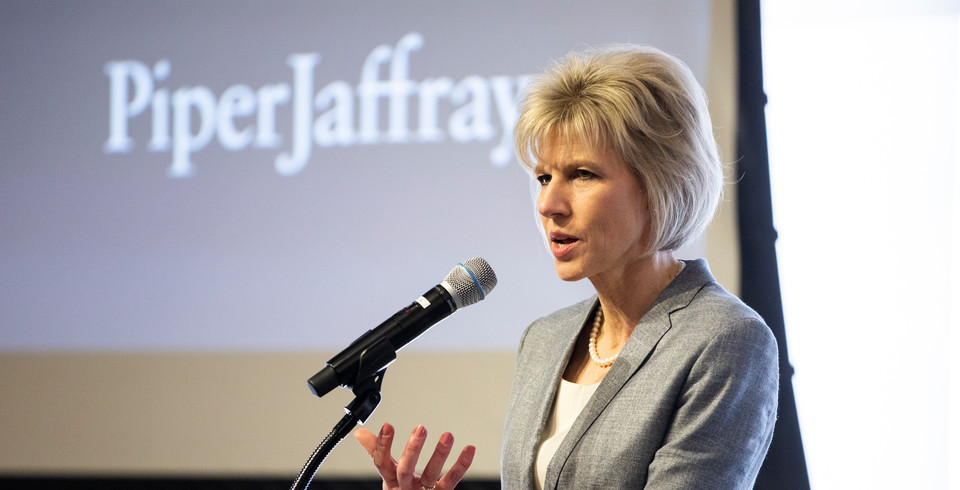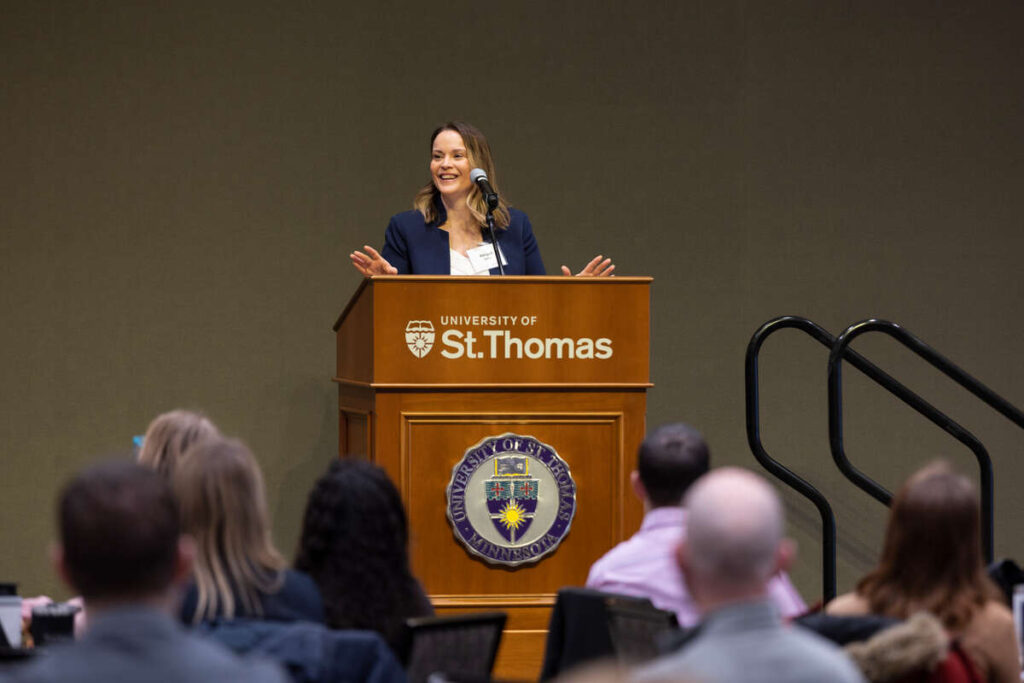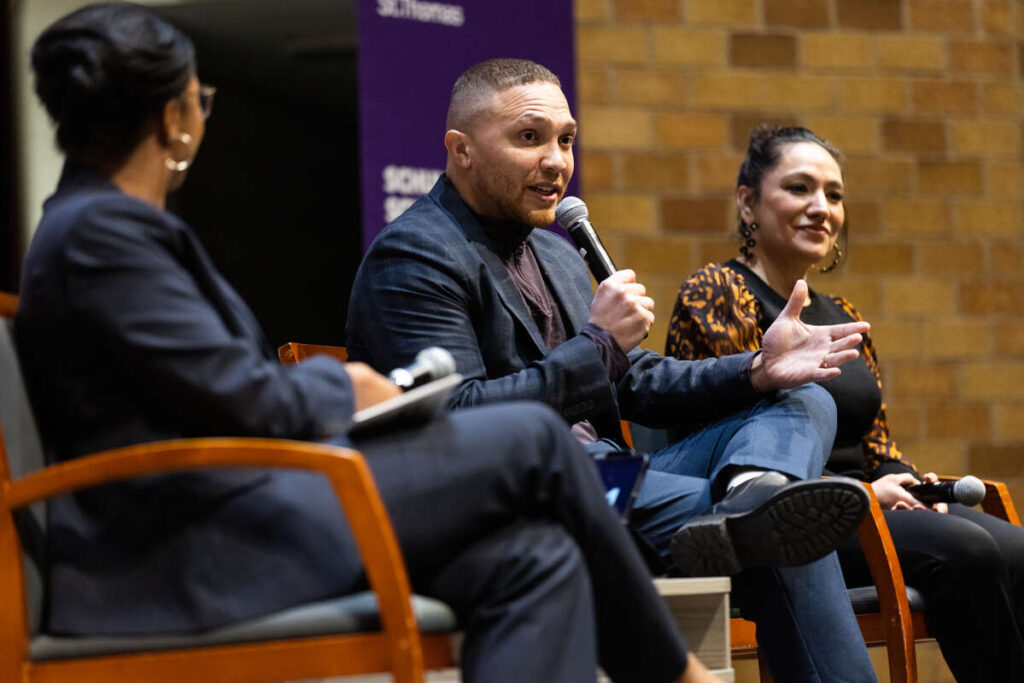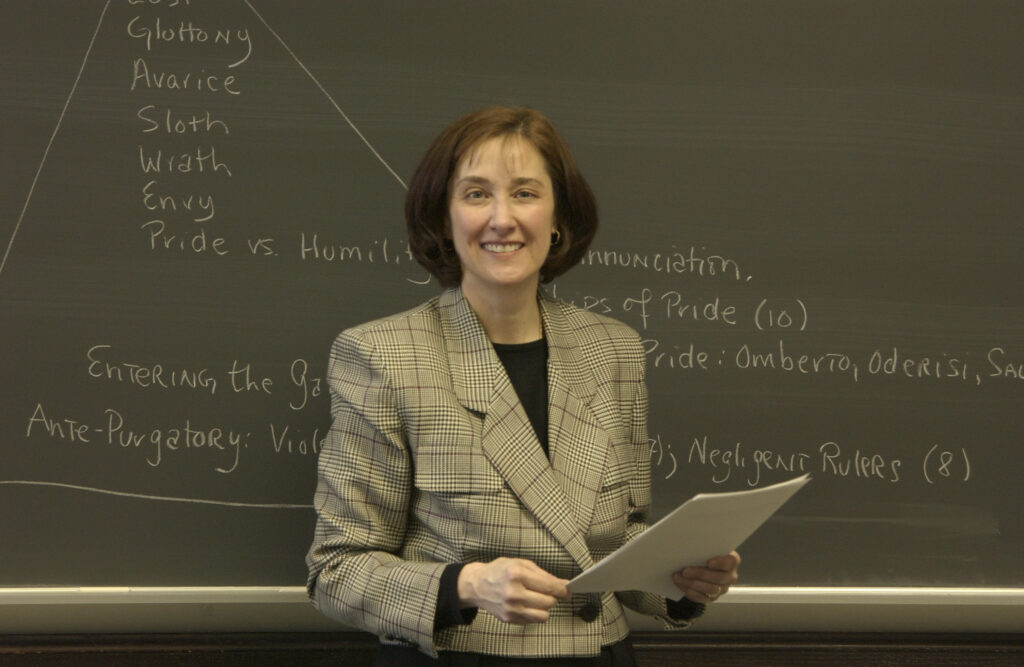Deb Schoneman '96 MBA, president of full-service U.S. investment bank and asset management firm Piper Jaffray, shared insights from her journey from intern to president on March 1 at James B. Woulfe Alumni Hall on the St. Paul campus.
Here are five observations from her talk, part of the 28th annual St. Thomas Alumni Association First Friday Speaker Series.
1. Relationships are built on trust.
Schoneman said trusted relationships helped her to succeed when she became treasurer of Piper Jaffray. She said the three components of trust are capability, reliability and sincerity.
Capability includes competence, proficiency and aptitude. "Are you showing up in a way with the skills necessary to follow through on the commitments? Are you able to do the task at hand?" Schoneman said. To increase her capability when she stepped into the treasurer role, Schoneman studied for and achieved the Certified Treasury Professional designation.
The second aspect of trust - reliability - involves performing consistently and being dependable. "Reliability is following through on time with your promises," Schoneman said. Since reliability is based on historical performance, she recommended to attendees not to over-promise on something that they can't deliver.
Sincerity is about aligning what you say publicly with what you say privately, Schoneman said. Vulnerability ties in with sincerity. "Being vulnerable is one of the strongest trust-building tools that you can have," she said.
2. To become more productive, become more authentic.
Schoneman described authenticity as being true to one's own personality, spirit or character.
"My ability to show up authentically was really one of the most transformational concepts for me to get my arms around," Schoneman said. She moved into the chief financial officer role at Piper Jaffray in 2008, a challenging time because of the financial crisis. She wasn't very happy in the role for the first 18 to 24 months and it was very stressful for her.
Thanks to some work the Piper Jaffray leadership team did with an outside consultant to become more effective, Schoneman understood the skills and value she brought to the CFO role. She became empowered and more authentic, which resulted in her being invited to more strategic conversations and feeling she was "driving value in doing something important for the company."
3. Awareness leads to choice.
Schoneman encouraged attendees to take a step back mentally and think about situations and actions that they are taking.
"If you're not aware of something, there is no way you can choose to make anything different," she said.
As an example of awareness in her life, Schoneman shared that she became aware of how much she values harmony from working with a professional coach. She has what she calls a "harmony meter."
"When my harmony meter goes off [when walking into situations in which people are disagreeing], I have a choice: I can choose to step in and do something, or I can choose to leave the room and walk away, knowing that it likely will get figured out all by itself," she said.
4. Confidence can be learned.
"Success correlates as closely to confidence as it does to competence," Schoneman said.
Having sponsors who believed in her assisted Schoneman along the way in her career. Since not everyone will have sponsors, confidence needs to come from within, she said.
Schoneman still struggles with confidence a bit, she added, and even was a bit unsure about accepting the invitation when President Julie Sullivan invited her to speak as part of the First Friday Speaker Series.
Part of confidence is "being willing to fail or willing to say, 'What is the worst thing that could happen?'" Schoneman said.
Reflecting on how she stepped outside of her comfort zone when she started in the treasurer role, she referenced a quote she has on her windowsill: "Life begins at the end of your comfort zone."
5. The way leaders show up influences the rest of the organization.
Answering a question from the audience about how leaders can take their own integrity and translate that into bigger organizational culture, Schoneman emphasized the importance of leading by example.
"If I'm walking down the hallway with a certain look on my face, people are going to be picking up on that, and if it's not good, wondering what's going on," Schoneman said. "It could just be that my daughter's having an issue."
Schoneman reinforced the importance of showing up with humility and vulnerability to make that OK for everyone else.







